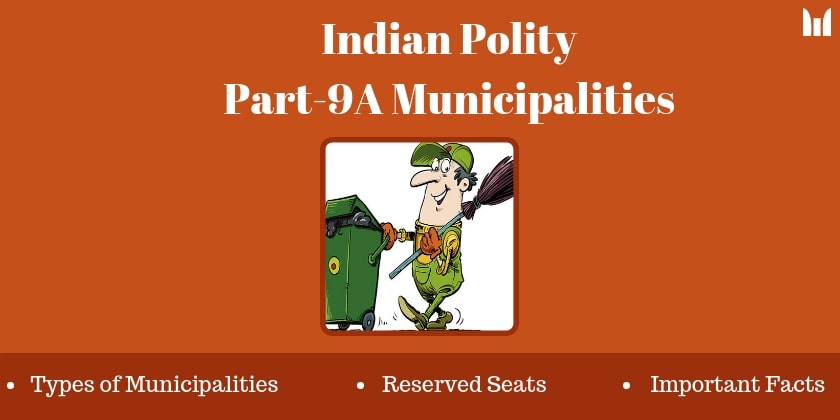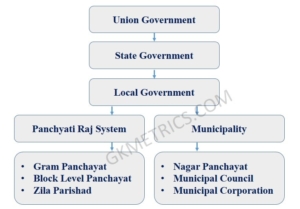Indian Constitution: Part 9A Municipalities
Under the Indian Constitution 74th Amendment Act, 1992 has introduced a new Part 9A in the Constitution, which deals with Municipalities in an article 243P to 243 ZG. This amendment, also known as Nagarpalika Act, came into force on 1st June 1993. The Municipalities are mentioned in the 12th Schedule of the Constitution.
Municipalities are situated in the Metropolitan area in the country in where the population is above 10 Lakh comes under Article 243P.
Types of Municipalities:
Under Article 243Q Municipalities are divided into three Parts:
1. Nagar Panchayat: An area which is being transformed from a rural area to an urban area, town.
2. Municipal Council: For a Smaller Urban area, like small Cities.
3. Municipal Corporation: For a larger urban area, like big Cities.
Reserved Seats in Municipalities:
1. Seats reserved for SCs and STs: Under Article 334, part IX reservations of Seats are to be made in behalf of Scheduled Castes and Scheduled Tribes in every Municipality.
2. Seats reserved for Women: seats to be filled by direct elections at least 1/3rd would be reserved for women. For the posts of members and Chairpersons, from 33% to 50% reserved for women.
3. Seats reserved for backward classes: The reservation of backward classes may be provided by the state legislature.
Important Facts about Municipalities:
- The 1st Municipal Corporation in India was set up in the year 1687, in Madras.
- In the year 1726 municipal corporations were set up in Bombay and Calcutta.
- In 1882, the viceroy of India Lord Rippon issued a resolution of Local Self government.
- Lord Rippon is called the ‘Father of Local Self Government” in India.
- Rajiv Gandhi was the first Prime Minister who made an attempt to provide the constitutional status to the Municipalities.
- In the year 1989, 65th Constitutional amendment bill (Nagar Palika bill) was introduced in the Parliament.
- Nagar Palika bill was passed in the Lok Sabha, but the Nagar Palika bill was rejected by the Rajya Sabha in October 1989.
- In September 1991 the 74th Constitutional amendment bill was introduced in Lok Sabha, the amendment bill was passed by both the houses of the Parliament in December 1992 and pass by the President in April 1993.
- The act also added the 12th schedule to the constitution.
- The members of a municipality shall be elected directly by the people.
- Members of Lok Sabha – representing the constituency of that area of local government.
- Article 243Q term is five years and every municipality is given a reasonable opportunity to be heard before its dissolution.
- The minimum age for Contesting election here is 21 years.
- The State Election Commission conducts the elections to both Municipalities and Panchayats.
- The State Election Commissioner is appointed by the Governor.
Important Article Under Municipalities:
1. Article 243P: Definitions of the municipality.
2. Article 243Q: Constitution of Municipalities.
3. Article 243R: Composition of Municipalities.
4. Article 243S: Constitution and composition of Wards Committees, etc.
5. Article 243T: Reservation of seats.
6. Article 243U: Duration of Municipalities, etc.
7. Article 243V: Disqualifications for membership
8. Article 243W: Powers, authority and responsibilities of Municipalities etc.
9. Article 243X: Power to impose taxes by, and Funds of, the Municipalities
10.Article 243Y: Finance Commission
11.Article 243Z: Audit of accounts of Municipalities
12.Article 243ZA: Elections to the Municipalities
13.Article 243ZB: Application to Union territories
14.Article 243ZC: Part not to apply to certain areas
15.Article 243ZD: Committee for district planning
16.Article 243ZE: Committee for Metropolitan planning
17.Article 243ZF: Continuance of existing laws and Municipalities
18.Article 243ZG: Bar to interference by Courts in electoral matters
Part 9A -Municipalities: MCQ’S
1. Which of the following Articles contains provisions regarding Municipalities?
A. Article 243 to 243L
B. Article 243B to 243M
C. Article 243P to 243ZG
D. Article 243S to 243ZA
[toggle] Answer – C[/toggle]
2. The Twelfth Schedule of the Constitution:
A. contains provisions relating to elections to Panchayats
B. contains subjects over which Municipalities may have control
C. contains recommendations relating to the establishment of State Finance Commission
D. was added by the 73rd Amendment Act
[toggle] Answer – B[/toggle]
3. Who is to conduct the elections to the Panchayats and Municipalities?
A. State Government
B. Central Government
C. State Election Commission
D. Central Election Commission
[toggle] Answer – C[/toggle]
4. A Municipal Corporation is set up in a city with a population of not less than:
A. 1 lakh
B. 12 lakh
C. 10 lakh
D. 5 lakh
[toggle] Answer – C[/toggle]
5. Who is the executive head of a Municipal Corporation?
A. Mayor
B. Secretary
C. Commissioner
D. Deputy Mayor
[toggle] Answer – B[/toggle]
6. Which of the following Article of the Constitution deal with the establishment of the Nagar Panchayats, Municipal Councils and Municipal Corporations?
A. Article 243Q
B. Article 243R
C. Article 243S
D. Article 243T
[toggle] Answer – A[/toggle]
7. The local self-governing institution for a town with a population of twelve thousand and above is known as :
A. Municipal Corporation
B. National Area Committee
C. Municipal Committee
D. Zila Parishad
[toggle] Answer – C[/toggle]
8. Mayor of a Municipal Corporation holds the office for a period of:
A. 1 year
B. 3 years
C. 5 years
D. 4 years
[toggle] Answer – A[/toggle]
9. Which of the following Article of the Constitution dealt with the reservation of seats to SCs and STs?
A. Article 243R
B. Article 243S
C. Article 243T
D. Article 243U
[toggle] Answer – C[/toggle]
10. The Municipalities get their grants from the
A. Consolidated Fund of India
B. Consolidated fund of the state
C. Contingency Fund of India
D. Social fund of India
[toggle] Answer – C[/toggle]


